Global logistics spending as a percentage of GDP is currently in the range of 10–11% globally, and it is projected to decline to around 9–10% by 2035. This reduction in spending is largely attributed to rapid technological advancements, integrated logistics systems, and a systemic shift toward multimodal transport solutions. These innovations help decrease inefficiencies and redundancies, streamline supply chains, and improve cost management. The proactive adoption of national policies, automation, and digital transformation are enabling countries to reduce overhead and optimize resource allocation, resulting in lower GDP share spent on logistics.
China’s, Indonesia’s, and Brazil’s logistics spending is expected to decline from 14%, 14%, and 16% of GDP in 2024 to roughly 13%, 8%, and 15% of GDP, respectively, by 2035., China’s, Indonesia’s, and Brazil’s logistics spending is expected to decline from 14%, 14%, and 16% of GDP in 2024 to roughly 13%, 8%, and 15% of GDP, respectively, by around 2035. These reductions are driven by structural reforms, large-scale infrastructure programs, and aggressive use of digital technologies to improve logistics efficiency. Besides, massive investments in multimodal infrastructure (rail corridors, ports, highways, dry ports) and streamlined border processes should shorten transit times, reduce empty backhauls, and improve asset utilization, lowering logistics costs relative to growing GDP.
Technology-driven innovation is central to how countries intend to compress logistics costs while handling larger trade and production flows, directly supporting the cost-reduction. Some of the examples are mentioned below.
1 - China: The national action plans explicitly promote “digital, smart and green” logistics, including unified data platforms, autonomous vehicles and drones in logistics parks, and smart warehouses with automation and IoT tracking. These technologies reduce manual handling, optimize routing and mode choice, and support a unified national market, all of which help drive the logistics-to-GDP ratio down by the 2030s.
2 - Indonesia: Government programs emphasize digital transformation of logistics services, integration of ports into information systems like Inaportnet, and broader National Logistics Ecosystem initiatives. Real-time tracking, standardized digital documentation, and smarter capacity planning cut port stay times and transport inefficiencies, enabling Indonesia to move from roughly 14% of GDP in logistics costs toward its long-term 8% target.
3 - Brazil: Technology is layered on top of big rail, road, and port projects, with growing adoption of transport management systems, real-time monitoring, and digital platforms for coordinating agricultural export flows. As rail networks expand under PNL 2035, analytics-driven scheduling, automated terminals, and better integration of road–rail–port interfaces help convert new capacity into real cost savings, modestly bringing the logistics-cost share down by 15% by 2035.
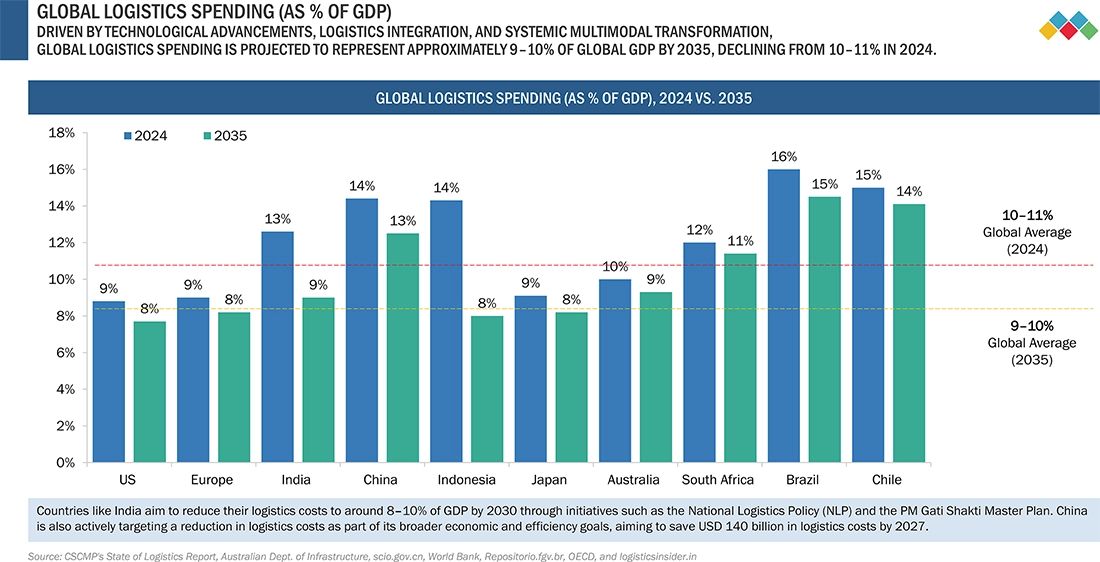
Key Drivers of Technological Innovation in Logistics
1 - Warehouse Robotic Solutions: Deployment and eventual full automation of warehouses using machine learning-driven robots to optimize inventory and space, transitioning to 24/7 robotic operations by 2035.
2 - Autonomous Vehicles (AVs): Pilots and rollouts of autonomous delivery fleets to address last-mile inefficiencies, leading to widespread Advanced Driver Assistance Systems ADAS Level 4 and 5 autonomy in transport operations with minimal human supervision.
3 - Blockchain: Technology increasing transparency across the logistics value chain and reducing fraud, later integrating with IoT for real-time shipment tracking and ultra-reliable blockchain updates.
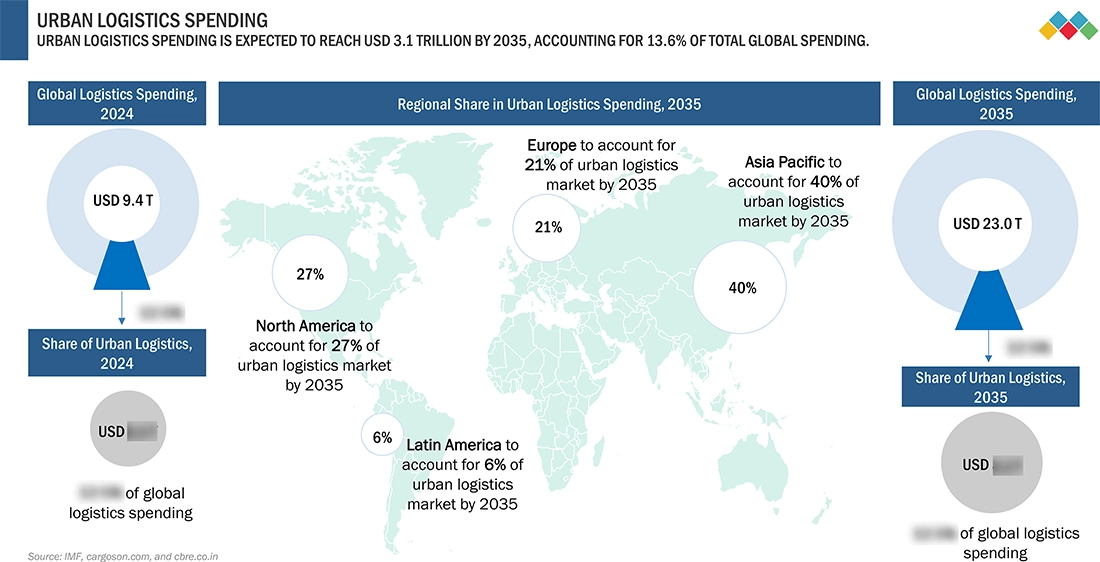
Digital platform adoption is projected to grow from 65-70% in 2024 to 85% by 2035, the increase in market penetration, indicating rapid digital transformation across the logistics sector as technology becomes critical for competitiveness and operational efficiency.
AI and predictive analytics as critical growth driver, 84% of leaders aim to implement AI-powered logistics by 2030 for cost reductions, speed, and accuracy improvements. AI and predictive analytics offer tangible ROI through automated decision-making, route optimization, and demand forecasting, making them essential for competitive survival.
API standardization enabling interoperability, over 70% of logistics software solutions in 2025 support API integration, reflecting a shift toward real-time data exchange and automated workflows. API standardization breaks down data silos, enables platform interoperability, and facilitates seamless integration across the supply chain ecosystem
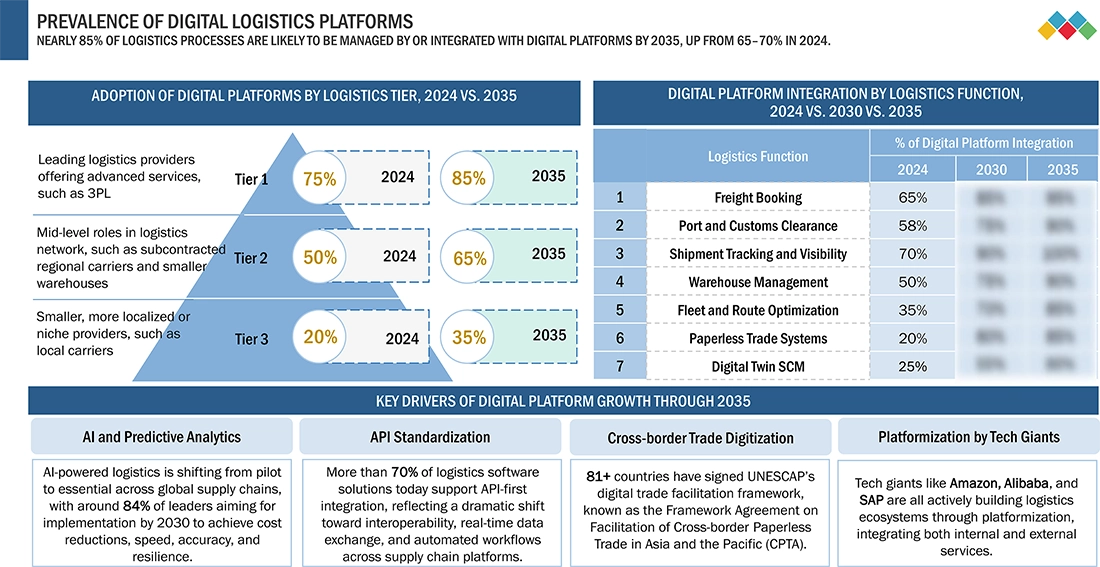
Urban logistics spending constitutes a significant share of total logistics spending, accounting for 13.6% of global logistics in 2024 and projected to remain prominent by 2035. Rapid urbanization, growing e-commerce, last-mile delivery demands, and increasing consumer expectations for speed and convenience. Urban areas require efficient transport infrastructure, warehousing, and digital logistics platforms to manage dense populations and high delivery volumes. Additionally, investments in smart city logistics and sustainability initiatives further amplify spending in urban supply chains as cities prioritize resilience and emissions reduction to support future growth
Urban Logistics Market Shares by Region (2035)
1 - Asia Pacific is projected to account for the highest share of the urban logistics market at 40% by 2035, driven by dense urban populations, booming e-commerce, and rapid infrastructure expansion.?
2 - North America will have the second highest share, representing 27% of the urban logistics market, due to advanced logistics technologies, high retail penetration, and extensive metropolitan areas.
3 - Europe holds the third highest share, accounting for 21% of the market by 2035, reflecting strong urbanization, regulatory focus on sustainability, and sophisticated logistics networks.
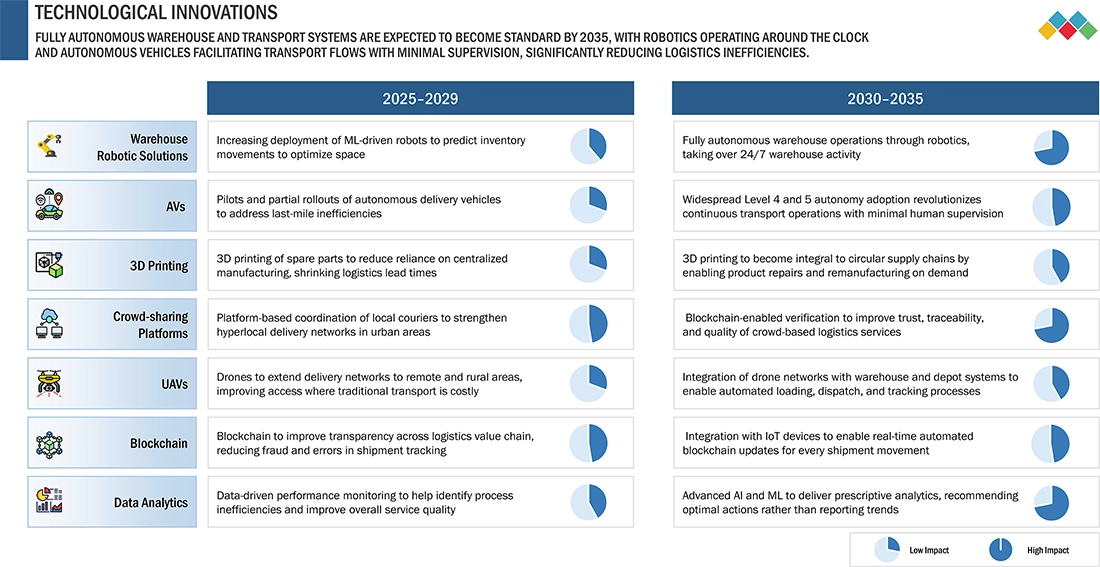
New Business Scenarios and Use Cases in Digital Logistics
5PL (Fifth-Party Logistics) providers serve as strategic orchestrators of the entire supply chain ecosystem, they will offer end-to-end visibility: granular, real-time tracking and analytics-empowered dashboards for full chain transparency?. By 2035, 5PL will be the AI-powered nerve center reinventing global supply chains—fusing autonomy, sustainability, and end-to-end digital orchestration in real time.
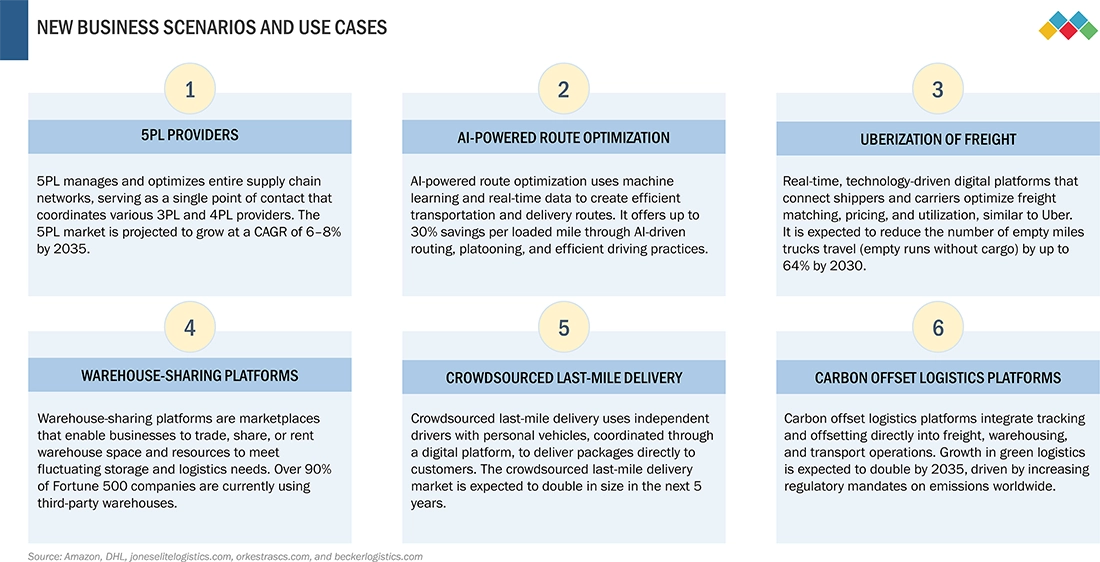
Conclusions: Logistics & Transportation Market
1 - By 2025, logistics relies on core technologies like AI, IoT, RPA, and autonomous vehicles for basic process efficiency; by 2035, full-scale automation through advanced robotics and AI allows for round-the-clock, autonomous supply chain operations—driven by labor cost pressures and operational scalability needs.
2 - Early regionalization aims to shorten and de-risk supply chains in 2025 as global tensions rise, transitioning by 2035 into optimized smart urban hubs integrating logistics, retail, and community functions, propelled by growth in urban populations and localized fulfillment demand.
3 - Industry starts with electric vehicles, green packaging, and renewable warehouses in 2025, and by 2035, zero-emission fleets and sustainable infrastructure are standard—mandated by stricter regulations and heightened corporate ESG commitments.?
Personalize This Research
- Triangulate with your Own Data
- Get Data as per your Format and Definition
- Gain a Deeper Dive on a Specific Application, Geography, Customer or Competitor
- Any level of Personalization
Request A Free Customisation
Let Us Help You
- What are the Known and Unknown Adjacencies Impacting the Logistics & Transportation Market
- What will your New Revenue Sources be?
- Who will be your Top Customer; what will make them switch?
- Defend your Market Share or Win Competitors
- Get a Scorecard for Target Partners
Customized Workshop Request



Growth opportunities and latent adjacency in Logistics & Transportation Market